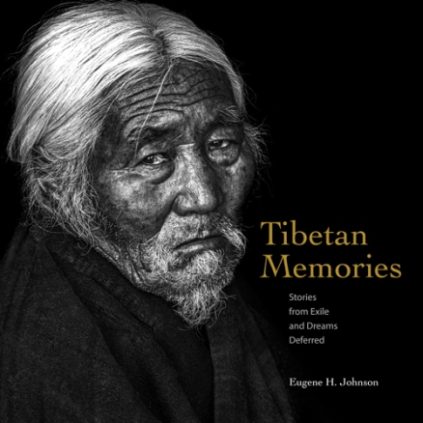-
Archives
- February 2025
- April 2024
- June 2022
- April 2021
- April 2020
- October 2019
- July 2019
- April 2018
- October 2017
- April 2017
- July 2015
- January 2015
- September 2014
- May 2013
- April 2013
- February 2013
- January 2013
- November 2012
- October 2012
- September 2012
- April 2012
- January 2012
- September 2011
- August 2011
- July 2011
- June 2011
- May 2011
- March 2011
- January 2011
- November 2010
- September 2010
- July 2010
- May 2010
- March 2010
- January 2010
- November 2009
- September 2009
- July 2009
- May 2009
- March 2009
- January 2009
- November 2008
- September 2008
- July 2008
- May 2008
-
Meta
Tibetan Memories: Stories From Exile and Dreams Deferred
Tibetan Memories: Stories From Exile and Dreams Deferred
Photographs and Text by Eugene H. Johnson
Foreword by Mirasol Delfin Johnson
George F. Thompson Publishing
April 2025
This is the first book to present the stories of ordinary Tibetan women and men in exile, in their own words, and the first with compelling portraits of the individuals featured––47 in all––along with gorgeous black-and-white photographs of the lands they embraced in Ladakh, where they fled after the Chinese annexed their homeland in 1959.
To meet the people and make these photographs, the Johnsons traveled throughout Ladakh, visiting many villages, and interviewing dozens of people. Most of them had to leave everything behind when they fled: family, friends, and often their most precious possessions: their animals, with whom they had a unique and symbiotic relationship.
The situation of the Tibetan refugees in Ladakh, and indeed, in the rest of India, which has the highest concentration of Tibetan refugees, is particularly heartbreaking as well as challenging. They cannot become citizens, own land or property, or travel freely internationally or even throughout India. They also are excluded from government or other public jobs.
Yet, as Dr. Johnson reveals in his photographs and stories, these refugees are, every one, remarkably resilient, wise, and hopeful. They have made their tragedy a source of strength, along with their unwavering devotion to their spiritual leader, the Dalai Lama, and to their Buddhist practice, which continues to sustain them. They maintain their belief that Tibet will one day be free, believing that losing that hope would be the ultimate disaster.
In a world full of exiles, 150,000 of which are Tibetan, this book is not only of historical significance, it is timely. It puts a human face on the increasingly complex and growing problem of people being forcibly displaced from their homelands––as many as 110 million according to a recent U.N. study. These remarkable individuals show us the meaning of hope and of never giving up. They also show us that every human being deserves compassion, for without it, the future of humanity stands in peril.
About the Author
Dr. Eugene H. Johnson has been Professor of Comparative Medicine at Sultan Qaboos University in Oman since 2000. Prior to that appointment, he worked as a National Institutes of Health Clinical Research Scientist at the Yale University Medical School. He has mentored numerous students and research scientists from many parts of the world
and written over one hundred and fifty peer-reviewed scientific articles. A passionate photographer, he is the author of four books: A Photographic Pilgrimage, Something’s Fishy, (Unspoken Dialogues, 2004) and a two-volume series commissioned by the late Sultan Qaboos bin Said of Oman, Reflections from the Not So Distant Past in Oman. His work has been featured in a number of magazines including Lenswork, Black and White Photography, Food and Travel, Iris Foto, Estado de Sao Paulo, Docubooks, and Whimsical Magazine, and in books such as Looking at Images by Brooks Jensen, the longtime editor of Lenswork. His work is held in numerous private and public collections including the Museum of Art in Sao Paulo, Brazil; Nairobi National Museum, Kenya; Banco do Brasil, Brazil; Brazilian American Cultural Institute, Washington, D.C.; Al-Bustan Palace, Oman; and the Royal Court of the Sultanate of Oman.
About the Contributor
Mirasol Delfin Johnson was born in the Rizal province of the Philippines and pursued her education at Roosevelt College in Manila and AMA University, Quezon City, Philippines, where she studied commerce and computer science. In 1988, she relocated to Norway, initially working with bilingual and half-Filipino-Norwegian children at the Educational and Learning Development Center in Oslo, and later becoming a representative for bilingual assistants from various countries as well as a legal interpreter and translator within both the judicial system and medical establishments. Her multifaceted cultural background has been invaluable in her role as the Associate Director of Unspoken Dialogues, a non-profit organization she co-founded with her husband, Eugene Johnson, to promote narrative photographic imagery that conveys universal themes of humanity. Proceeds from the sale of prints and books are donated for educational and child health development programs.


